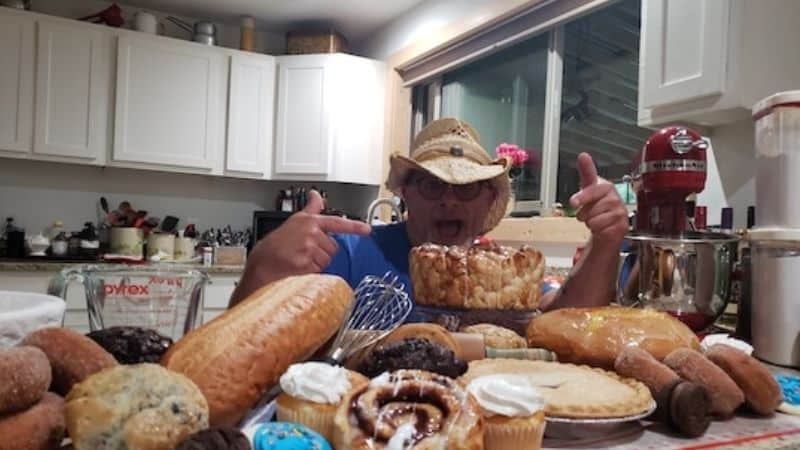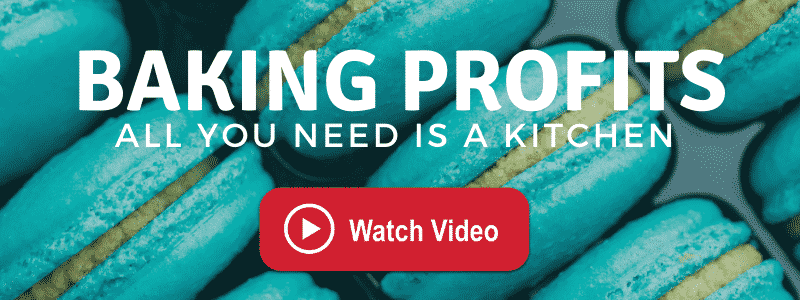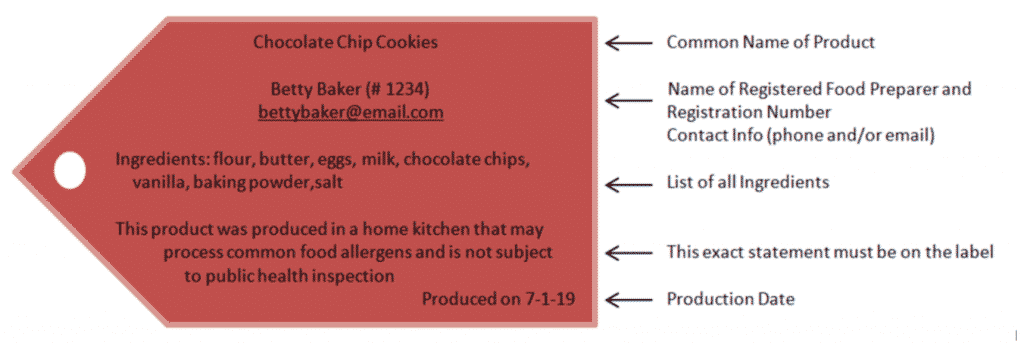Alabama Cottage Food Laws allows individuals to make homemade products that are neither potentially hazardous nor Time or Temperature Control for Safety (TCS) Foods, and offer them for commercial sale.
Although more limiting on what you can offer, Alabama has excluded two counties from some of the rules in an effort to promote small business.
Montgomery and Calhoun counties are exempt from some of the restrictions. This allows cottage food entrepreneurs in these counties more opportunity and allows for a broader menu. (more on that below)
Table of Contents
ALABAMA COTTAGE FOOD LAWS – Foods That Are Allowed

The following list is comprised from known non-potentially hazardous foods.
Home processed foods, with the exception of low acid foods, that do not have to be time or temperature controlled for safety can be prepared in a kitchen, in a private home and may be sold at state sanctioned Farmers Markets with appropriate labeling.
According to the official video below, fairs and festivals are also places where cottage foods can be sold.
- Breads (Sweet breads and Plain bread)
- Bagels
- Biscuits
- Brittles
- Brownies and fudge
- Cakes – teacher turns kitchen into bakery
- Candies
- Caramel corn
- Chocolate Fudge
- Chocolate-covered fruit
- Chocolate-covered items
- Cookies
- Crackers
- Doughnuts – cottage mini donut vendor
- Dry pasta
- Dried and dehydrated vegetables and fruits
- Dried baking mixes
- Dry spice mixes
- Fermented or preserved vegetables or fruit
- Fruit jams and jellies – See Additional Requirements Here
- Fruit preserves
- Funnel Cakes
- Granola
- Honey
- Kettle corn – real kettle corn vendors from home
- Spices & Seasoning Mixes
- Muffins
- Pastries
- Pies (Fruit pies with fruit and sugar fillings)
- Popcorn (plain and flavored) – see a real home vendor here
- Pretzels
- Pumpkin breads, cakes, cookies, muffins, and rolls
- Roasted coffee beans
- Roasted nuts
- Rolls
- Scones
- Tarts
- Toffee
- Tortillas
- Truffles
- Waffle cones
CALHOUN AND MONTGOMERY COUNTY COTTAGE FOOD EXCEPTIONS
Montgomery county and Calhoun county are exempt under state law from the restriction to foods that are low acidic or temperature controlled (kept in a fridge).
This includes, canned vegetables, slaws, soups, stews, sauces and any food containing meat or other potentially hazardous ingredients.
If you are starting in either of these counties, contact the Alabama Department of Agriculture and Industry at 877-774-9519 and confirm your chosen foods.
ACIDITY LEVELS AND TESTING
Most states determine if a food is non-potentially hazardous by the acidity level found in the food. The higher the acidity, the more stable at a range of temps, that food product is.
For example: milk is low acidity and requires temperature controls.
The acidity of foods is measured by pH.
• The range of pH is commonly considered to extend from zero to 14. A pH value of 7 is neutral because pure water has a pH value of exactly 7. Values less than 7 are considered acidic, while those greater than 7 are considered basic or alkaline.
• All fruits are acidic foods and are usually tart and sour. Ex: tomato, lemon, peach, apple, etc.
• The FDA rule for acidic foods states that a food must have a pH below 4.6 to be sold as a minimally processed food.
• Reason for this is bacteria does not grow at this level of acidity.
• Exclusion shall not be construed as allowing the sale of low acid foods (pH > 4.6) in
hermetically sealed containers (i.e. home-canned green beans, peas, etc.) when such
food is not prepared in a permitted establishment. *Exceptions for Montgomery and Calhoun Counties.
TESTING
Some states require testing if the pH level is unknown. For many food products, the pH level is already known.
You can test for pH yourself using a pH spear tester. (make sure it is made for food and has a long spear tip).
Oklahoma State University shares an awesome guide for selecting the correct tester for foods and liquids which includes tips and tricks for operation and maintenance. Get The Guide Here.
ALABAMA FOOD TESTING REQUIREMENTS
If the pH level is unknown, the finished product will need to be tested at an independent certified food testing laboratory or the laboratory operated by ACES at Auburn University or the Food Lab at the Alabama Department of Agriculture & Industries.
A small sample (as packaged to the consumer @ 4 oz. minimum) of each product is required.
The product must include the following information: Contact Name, Mailing Address, City/
State/Zip, Phone/Fax, Email, Product Name,Recipe and Payment.
DO YOU NEED OUTSIDE TESTING?
How do you know if you even need pH (acidity level) testing on the products you’re planning on offering? Call 877-774-9519 and ask.
Remember, these folks work for us. Our taxes pay for these programs and the employees that run them.
ALABAMA LIMITS ON INCOME FROM A COTTAGE FOOD BUSINESS

You cannot exceed $20,000 in gross sales of the food described under the Alabama Cottage Food Laws. [UPDATE: Beginning August 1, 2021, this limit will be removed!]
Alabama Department of Agriculture and Industries
Alabama’s logic and politics behind this is to limit competition to restaurants and food vendors under the guise of letting you earn up to $20,000 – to then invest into your own commercial establishment.
They feel keeping someone at below poverty levels of income is a great way to encourage entrepreneurship. *no charge for sarcasm
Some cottage food owners have simply let another family member get licensed once they reach $20,000 in income so they can continue to do business, save and eventually open a commercial business.
ALABAMA COTTAGE FOOD LAWS VIDEO
For the other three (3) videos in this four part series, please click here.
ALABAMA COTTAGE FOOD LAWS – PROHIBITED FOODS
The following is a list of the prohibited foods. These items are excluded in most every state:
- Meat, Poultry, Fish
- Shellfish and Crustaceans
- Eggs
- Milk and dairy products
- Baked potatoes
- Heat-treated plant food (cooked rice, beans, or vegetables)
- Certain synthetic ingredients
- • Mushrooms, raw sprouts, cut melons, cut tomatoes, cut leafy greens
- Tofu and soy protein foods
- Untreated garlic and oil mixtures
- Custards, puddings, cakes with custard fillings, meringues, cheese cakes, pumpkin, cream or custard pies and other desserts containing ingredients of animal origin, should be assumed to be potentially hazardous
- Garlic in oil
- Heat processed canned foods (there are exceptions)
NOTE: Although eggs, milk and dairy products are listed as prohibited foods, used as ingredients for the allowed foods – is acceptable.
Many prohibited foods that are baked or cooked into the allowed foods are rendered harmless and therefore allowed.
NOTE: According to Alabama’s state laws, Montgomery and Calhoun counties are allowed to offer some foods listed in the prohibited list.
HOW TO START YOUR COTTAGE FOOD BUSINESS IN ALABAMA – FAST LICENSING
- Watch the Introduction to the Cottage Food Law Video here.
- The watch the Cottage Food Law: Food Safety Video here.
- And watch the Cottage Food Law: Making Jams and Jellies Video here.
- You will need to watch all four videos before registering to take the online exam.
- Contact your city / county for business license requirements
The last step above is to cover yourself in case your county or city requires anything extra. This is usually not the case but an ounce of prevention is worth a pound of cure. 😉
CONTINUING EDUCATION
The person operating a food business under the Alabama Cottage Food Laws must attend and pass a food safety course approved by the Alabama Department of Public Health every 5 years.
ALABAMA COTTAGE FOOD LAWS LABELING REQUIREMENTS
Most states require labeling on any product produced at a home kitchen.
However, even if your state doesn’t require labeling, this is your chance to stand out and show you care.
The Alabama Cottage Food Laws requires the following on labels:
- Name of the individual or business
- Address of the individual or business
- This item(s) was prepared in a kitchen that is NOT inspected by a regulatory agency.
Below is an example of what the state of Arizona requires on their labels.
Using VistaPrint.com or similar – you can quickly create professional labels that not only serve to meet the state cottage food guidelines but also serve for marketing your awesome business and products.
You’ll find some fantastic examples of this from members inside VendorsUnited.com

ALLERGENS ON LABELING
The FDA lists nine (9) major food allergens. Listing any of these on your label is a smart business practice and will certainly help your customers choose a product.
- Milk
- Eggs
- Fish (e.g., bass, flounder, cod)
- Crustacean shellfish (e.g., crab, lobster, shrimp)
- Tree nuts (e.g., almonds, walnuts, pecans)
- Peanuts
- Wheat
- Soybeans
- Sesame
Simply add to your label: “NOTICE: SOYBEANS USED IN THIS RECIPE” Some go as far to announce that a certain allergen is used in the same kitchen.
Some states require you list any potential allergens and potential for any cross contamination even if the allergen is not used in the recipe.
WHERE CAN I SELL MY COTTAGE FOOD PRODUCTS
Alabama allows you to sell to the public but not to a business for re-sale. In the video above, at the .42 second mark, the narrator explains where you can and CAN’T sell your products.
Pay careful attention – because although the state guidelines say you can not sell your product over the internet – this is clarified and allowable.
You can sell from your home, take orders via the internet and sell at fairs, festivals and farmers markets according to the state sponsored video above. [UPDATE: as of 8/1/2021 you can sell online and ship products in state.]
Inside kitchenincome.com you can find out how many cottage food entrepreneurs are getting sales faster than they can make the food.
FOOD HANDLER TRAINING AND BEST PRACTICES
ALABAMA COTTAGE FOOD TRAINING
Only after you have watched the four (4) videos are you allowed to take the test. You can take the test online or in person.
SAFE PRACTICES
Much of this may seem like common sense, but even if you already know, it’s a good idea to remind yourself with a list of things that can prevent you from missing something small.
And if for no other reason… CYA! CYA = Cover Your A#%
CLEAN WORK AREA / WORK SPACE / SANITIZATION
Providing safe to eat foods from your kitchen – starts in your kitchen.
Keep your area clean and sanitized to avoid cross contamination and to insure you provide your customers and clients with the safest and best foods they can get.
The following are some “common” sense things you can do to insure the best environment for preparing foods to sell:
- Keep all equipment and surface areas clean and sanitized
- Make sure window and door screens are bug proof with no gaps
- Keep ingredients separate to prevent cross contamination / e.g. raw eggs near flour
- No pets in work area and preferably none in the home
- Allow no-one with a cold, sniffles or sick in kitchen while preparing foods
- Wipe down walls and clean floors daily
- Use good lighting to avoid missing unclean areas
- Keep window and door screens in good repair to keep insects out
- Wash hands frequently while working and use food grade gloves for extra safety
- Keep areas of food storage and equipment storage clean and sanitized
RECORD KEEPING
Why keep these types of records?
Let’s say the inspector calls you and says they got a report that your banana bread, someone purchased, made them sick.
You’ll be able to show that you didn’t even make banana bread that week and that the person who reported you, bought that 4 weeks ago and you weren’t even the one that sold it to him.
This does not need to be complicated. I love my yellow legal pads and they make an inexpensive tool for keeping up with the following:
- The recipes you use including ingredients
- The process you use to prepare that specific recipe: (can be just like recipe instructions)
- Date made (can be coded for your own use only if your state doesn’t require the production date) e.g. Made 12.22.29 = 292212
- Date sold (you can have a batch code to help track a certain batch) Simply write down date you sold an item
- Location sold is another great piece of information to keep track of
- Sales receipts are something great to keep for a couple of reasons and over at KitchenIncome.com I dive into the best practices, best systems and best methods for tracking, managing, selling and shipping.
COTTAGE FOOD lIABILITY INSURANCE
We live in a society that likes to sue. I can sue you for wearing that color shirt. No kidding!
Of course I probably won’t win, but at the very least, it’s gonna cause you stress and some costs.
Liability insurance is a MUST!
It can be expensive – but several years ago, I found FLIP and by far, they gave me the most protection (coverage) and allow you to run your cottage food business without fear of being sued.
WHY? Because they provide the lawyers. And their lawyers… they are good!
Of course you should price shop around with your local agent or a national brand company, but rest assured, I’ve done all the legwork for you.
Alternatively, some folks opt to get bonded. You’ve heard the saying before: “licensed and bonded”. A bond is usually provided from an insurance bonding company or your own insurance company.
My first time, I got a bond at State Farm.
A bond is expensive comparatively but is less out of pocket in the beginning. Of course, it’s way, way less insurance / coverage too.
A $10,000 bond may cost $50 annually while a $2,000,000.00 liability policy may cost a few hundred a year.
No matter what you decide… knowing you’re insured against frivolous lawsuits is worth every penny.
ALABAMA COTTAGE FOOD RESOURCES
- Alabama Cottage Food Act – Course & Testing
- Alabama Cottage Food Law: Basic Rules and Regulations
- The Alabama Agriculture Extension Contacts By County
- Alabama Farmers Market Authority site
- And Alabama Cottage Food Business – Brochure
CONTACT ALABAMA’S COTTAGE FOOD INDUSTRY FOR MORE HELP
Farmers Market Authority
Richard Beard Building
1445 Federal Drive
Montgomery, Alabama 36107
Phone: 334-240-7247
Toll Free: 877-774-9519
Email: [email protected]
Website: www.fma.alabama.gov
UPDATES TO ALABAMA COTTAGE FOOD LAWS
From time to time, links, info, rules and numbers change, are updated or made obsolete.
Although I spend time daily with hundreds of vendors (many of which are cottage food businesses) – I can miss an update.
If you find a broken link or outdated state information… please let me know and I’ll send you a special thank you for helping me maintain the best site on the internet for the cottage food industry.
My goal has always been to have a central place that is absolutely free for those starting out or existing entrepreneurs who use their homes and kitchens to make real incomes.
Please send to [email protected] / or post inside the private VendorsUnited.com group.
Need more resources? Check it out HERE (Helpful Resources)
Take a peek at the best vendors on the planet, the community that rocks the food vending world: Vendors United…

Disclaimer
This information is provided to help those interested in starting a cottage food business. It is not a document made by the state government. This information is not provided as law nor should be construed as law. Always use the contact information for each state to confirm compliance and any changes.
Did we help you? Help us to share this information…
 WATCH VIDEO!
WATCH VIDEO! WATCH VIDEO!
WATCH VIDEO!